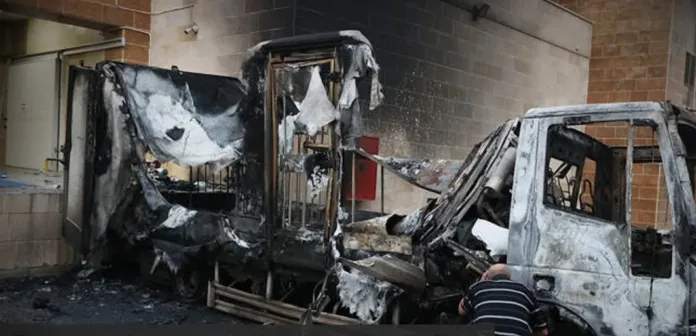Israeli President denounces violent settler rampage that left homes battered and Palestinians injured
A wave of violence swept through the occupied West Bank on Tuesday as dozens of masked Israeli settlers attacked two Palestinian villages, injuring residents and even turning on Israeli soldiers who attempted to intervene. The events sparked an unusually forceful condemnation from the Israeli president, Isaac Herzog, who described the incidents as shocking and serious.
The attacks targeted the villages of Beit Lid and Deir Sharaf, where settlers set vehicles on fire, damaged property and struck fear into the local community. Charred shells of cars remained scattered across the streets the following morning. The al Juneidi dairy factory, a significant employer in the area, was not spared. Four of its trucks loaded with goods were set alight, leaving local workers shaken and facing yet another blow to livelihoods that have already been strained by the ongoing conflict.
Settler violence has surged since the outbreak of the Gaza war two years ago. At least one thousand and one Palestinians have been killed in the West Bank and East Jerusalem by either settlers or Israeli soldiers during that period. The United Nations reported two hundred and sixty settler attacks in October alone, marking the deadliest month since record keeping began in 2006.
Human rights organisations say the violence is unfolding in what they describe as a permissive environment. According to the United Nations human rights office, settler groups appear intent on accelerating the removal of Palestinians from their land, raising fears of forcible transfer. Rights groups argue that the current political climate in Israel has emboldened settlers, many of whom enjoy the support of influential ministers.
In a rare statement, President Herzog said the attacks had been carried out by a small group but insisted that they must be confronted head on. He urged Israeli authorities to act decisively to end the violence and to support soldiers and security forces who face these outbreaks while protecting civilians. His remarks echoed those of Maj Gen Avi Bluth, the senior Israeli military official in the West Bank, who labelled the attacks unacceptable.
Such statements stand out in a political landscape where settler violence is often ignored or downplayed. In recent years the Israeli military and government officials have rarely addressed the growing number of violent incidents, even as they escalate in frequency and severity. Videos have frequently shown soldiers and police standing by while settlers assault Palestinians or destroy property, intervening only when Palestinians attempt to defend themselves.
The Israeli army said soldiers responded to the attacks on Tuesday and that the settlers fled to a nearby industrial zone. There they reportedly turned on the soldiers, damaging a military vehicle during the confrontation. Police later confirmed that four settlers were arrested, an uncommon outcome given the long standing pattern of impunity for such acts.
The issue of accountability has been illustrated by cases like that of Yinon Levi, a settler previously placed under United States sanctions. In July he was filmed shooting dead the Palestinian activist Awdah Hathaleen. Despite the video evidence he was arrested only briefly before being released.
Rights groups point to the far right composition of the current Israeli government which includes senior figures from the settler movement such as finance minister Bezalel Smotrich and national security minister Itamar Ben Gvir. Critics argue that their influence has helped normalise settler violence and create conditions where armed vigilante groups can operate with minimal restraint. Ben Gvir has also relaxed gun laws and promoted the creation of civilian guard units, moves that activists fear will deepen the violence.
The growing number of attacks has drawn international condemnation. A widely shared video last month showing a settler clubbing a woman in the head until she collapsed unconscious produced global outrage.
For Palestinians living in targeted areas fear has become a constant presence. In Beit Lid, one of the villages attacked on Tuesday, resident Mahmoud Edeis said the official statements did little to ease anxiety. He described a community living on edge, unsure when another assault might erupt. He said that life cannot continue under such danger and uncertainty, and that residents deserve real protection rather than repeated cycles of violence and fear
